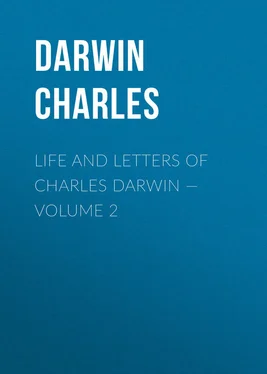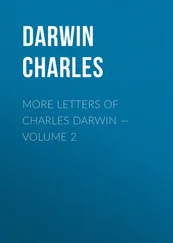Charles Darwin - Life and Letters of Charles Darwin — Volume 2
Здесь есть возможность читать онлайн «Charles Darwin - Life and Letters of Charles Darwin — Volume 2» — ознакомительный отрывок электронной книги совершенно бесплатно, а после прочтения отрывка купить полную версию. В некоторых случаях можно слушать аудио, скачать через торрент в формате fb2 и присутствует краткое содержание. Жанр: foreign_antique, foreign_prose, на английском языке. Описание произведения, (предисловие) а так же отзывы посетителей доступны на портале библиотеки ЛибКат.
- Название:Life and Letters of Charles Darwin — Volume 2
- Автор:
- Жанр:
- Год:неизвестен
- ISBN:нет данных
- Рейтинг книги:3 / 5. Голосов: 1
-
Избранное:Добавить в избранное
- Отзывы:
-
Ваша оценка:
- 60
- 1
- 2
- 3
- 4
- 5
Life and Letters of Charles Darwin — Volume 2: краткое содержание, описание и аннотация
Предлагаем к чтению аннотацию, описание, краткое содержание или предисловие (зависит от того, что написал сам автор книги «Life and Letters of Charles Darwin — Volume 2»). Если вы не нашли необходимую информацию о книге — напишите в комментариях, мы постараемся отыскать её.
Life and Letters of Charles Darwin — Volume 2 — читать онлайн ознакомительный отрывок
Ниже представлен текст книги, разбитый по страницам. Система сохранения места последней прочитанной страницы, позволяет с удобством читать онлайн бесплатно книгу «Life and Letters of Charles Darwin — Volume 2», без необходимости каждый раз заново искать на чём Вы остановились. Поставьте закладку, и сможете в любой момент перейти на страницу, на которой закончили чтение.
Интервал:
Закладка:
Many thanks for Huxley's lecture. The latter part seemed to be grandly eloquent.
... I have gone over [the 'Edinburgh'] review again, and compared passages, and I am astonished at the misrepresentations. But I am glad I resolved not to answer. Perhaps it is selfish, but to answer and think more on the subject is too unpleasant. I am so sorry that Huxley by my means has been thus atrociously attacked. I do not suppose you much care about the gratuitous attack on you.
Lyell in his letter remarked that you seemed to him as if you were overworked. Do, pray, be cautious, and remember how many and many a man has done this — who thought it absurd till too late. I have often thought the same. You know that you were bad enough before your Indian journey.
CHARLES DARWIN TO C. LYELL. Down, April [1860].
My dear Lyell,
I was very glad to get your nice long letter from Torquay. A press of letters prevented me writing to Wells. I was particularly glad to hear what you thought about not noticing [the 'Edinburgh'] review. Hooker and Huxley thought it a sort of duty to point out the alteration of quoted citations, and there is truth in this remark; but I so hated the thought that I resolved not to do so. I shall come up to London on Saturday the 14th, for Sir B. Brodie's party, as I have an accumulation of things to do in London, and will (if I do not hear to the contrary) call about a quarter before ten on Sunday morning, and sit with you at breakfast, but will not sit long, and so take up much of your time. I must say one more word about our quasi-theological controversy about natural selection, and let me have your opinion when we meet in London. Do you consider that the successive variations in the size of the crop of the Pouter Pigeon, which man has accumulated to please his caprice, have been due to "the creative and sustaining powers of Brahma?" In the sense that an omnipotent and omniscient Deity must order and know everything, this must be admitted; yet, in honest truth, I can hardly admit it. It seems preposterous that a maker of a universe should care about the crop of a pigeon solely to please man's silly fancies. But if you agree with me in thinking such an interposition of the Deity uncalled for, I can see no reason whatever for believing in such interpositions in the case of natural beings, in which strange and admirable peculiarities have been naturally selected for the creature's own benefit. Imagine a Pouter in a state of nature wading into the water and then, being buoyed up by its inflated crop, sailing about in search of food. What admiration this would have excited — adaptation to the laws of hydrostatic pressure, etc. etc. For the life of me I cannot see any difficulty in natural selection producing the most exquisite structure, IF SUCH STRUCTURE CAN BE ARRIVED AT BY GRADATION, and I know from experience how hard it is to name any structure towards which at least some gradations are not known.
Ever yours, C. DARWIN.
P.S. — The conclusion at which I have come, as I have told Asa Gray, is that such a question, as is touched on in this note, is beyond the human intellect, like "predestination and free will," or the "origin of evil."
CHARLES DARWIN TO J.D. HOOKER. Down, [April 18th, 1860].
My dear Hooker,
I return — 's letter... Some of my relations say it cannot POSSIBLY be — 's article (The 'Edinburgh Review.'), because the reviewer speaks so very highly of — . Poor dear simple folk! My clever neighbour, Mr. Norman, says the article is so badly written, with no definite object, that no one will read it. Asa Gray has sent me an article ('North American Review,' April, 1860. "By Professor Bowen," is written on my father's copy. The passage referred to occurs at page 488, where the author says that we ought to find "an infinite number of other varieties — gross, rude, and purposeless — the unmeaning creations of an unconscious cause.") from the United States, clever, and dead against me. But one argument is funny. The reviewer says, that if the doctrine were true, geological strata would be full of monsters which have failed! A very clear view this writer had of the struggle for existence!
... I am glad you like Adam Bede so much. I was charmed with it...
We think you must by mistake have taken with your own numbers of the 'National Review' my precious number. (This no doubt refers to the January number, containing Dr. Carpenter's review of the 'Origin.') I wish you would look.
CHARLES DARWIN TO ASA GRAY. Down, April 25th [1860].
My dear Gray,
I have no doubt I have to thank you for the copy of a review on the 'Origin' in the 'North American Review.' It seems to me clever, and I do not doubt will damage my book. I had meant to have made some remarks on it; but Lyell wished much to keep it, and my head is quite confused between the many reviews which I have lately read. I am sure the reviewer is wrong about bees' cells, i.e. about the distance; any lesser distance would do, or even greater distance, but then some of the places would lie outside the generative spheres; but this would not add much difficulty to the work. The reviewer takes a strange view of instinct: he seems to regard intelligence as a developed instinct; which I believe to be wholly false. I suspect he has never much attended to instinct and the minds of animals, except perhaps by reading.
My chief object is to ask you if you could procure for me a copy of the "New York Times" for Wednesday, March 28th. It contains A VERY STRIKING review of my book, which I should much like to keep. How curious that the two most striking reviews (i.e. yours and this) should have appeared in America. This review is not really useful, but somehow is impressive. There was a good review in the 'Revue des Deux Mondes,' April 1st, by M. Laugel, said to be a very clever man.
Hooker, about a fortnight ago, stayed here a few days, and was very pleasant; but I think he overworks himself. What a gigantic undertaking, I imagine, his and Bentham's 'Genera Plantarum' will be! I hope he will not get too much immersed in it, so as not to spare some time for Geographical Distribution and other such questions.
I have begun to work steadily, but very slowly as usual, at details on variation under domestication.
My dear Gray, Yours always truly and gratefully, C. DARWIN.
CHARLES DARWIN TO C. LYELL. Down, [May 8th, 1860].
... I have sent for the 'Canadian Naturalist.' If I cannot procure a copy I will borrow yours. I had a letter from Henslow this morning, who says that Sedgwick was, on last Monday night, to open a battery on me at the Cambridge Philosophical Society. Anyhow, I am much honoured by being attacked there, and at the Royal Society of Edinburgh.
I do not think it worth while to contradict single cases nor is it worth while arguing against those who do not attend to what I state. A moment's reflection will show you that there must be (on our doctrine) large genera not varying (see page 56 on the subject, in the second edition of the 'Origin'). Though I do not there discuss the case in detail.
It may be sheer bigotry for my own notions, but I prefer to the Atlantis, my notion of plants and animals having migrated from the Old to the New World, or conversely, when the climate was much hotter, by approximately the line of Behring's Straits. It is most important, as you say, to see living forms of plants going back so far in time. I wonder whether we shall ever discover the flora of the dry land of the coal period, and find it not so anomalous as the swamp or coal-making flora. I am working away over the blessed Pigeon Manuscript; but, from one cause or another, I get on very slowly...
This morning I got a letter from the Academy of Natural Sciences of Philadelphia, announcing that I am elected a correspondent... It shows that some Naturalists there do not think me such a scientific profligate as many think me here.
Читать дальшеИнтервал:
Закладка:
Похожие книги на «Life and Letters of Charles Darwin — Volume 2»
Представляем Вашему вниманию похожие книги на «Life and Letters of Charles Darwin — Volume 2» списком для выбора. Мы отобрали схожую по названию и смыслу литературу в надежде предоставить читателям больше вариантов отыскать новые, интересные, ещё непрочитанные произведения.
Обсуждение, отзывы о книге «Life and Letters of Charles Darwin — Volume 2» и просто собственные мнения читателей. Оставьте ваши комментарии, напишите, что Вы думаете о произведении, его смысле или главных героях. Укажите что конкретно понравилось, а что нет, и почему Вы так считаете.












